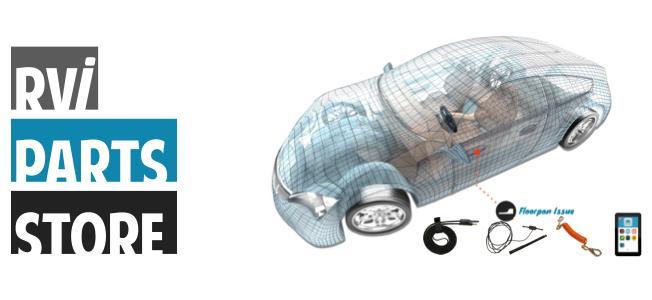We talk a lot about flat towing here on our blog - after all, it is the primary focus for us as a company. But sometimes it’s nice to pull back and get a bird’s-eye, thirty-thousand-foot view of the topic. With all the information out there, it’s very easy to get confused by things. So, in this blog post, we’re aiming to keep it short and sweet and cover the absolute, bare-bones essentials you’ll need to get started and why.
We’re going to look at three primary systems we think everyone should have: A braking system, a Tire Pressure Monitoring System (TPMS), and a battery charger. For a deeper dive on these and things like tow bars, making sure to check out our Flat Towing Guide HERE.
Let’s get to it!
BRAKING SYSTEM
Let’s start with the most basic fact there is: Legally, you need a braking system. Some states that’s based on the weight of the towed vehicle, others it’s judged by stopping distance - but, in either case, the legal limits are usually so low that anything over a Smart car will need still need one. It goes beyond pure legality though; not having a braking system puts you and others at serious risk during a panic stop. Most people don’t realize it, but, for every thousand pounds of towed vehicle you add, your stopping distance can increase by up to 10-20 feet. That extra distance makes all the difference in the world when you need to get on the brakes fast. A good braking system will take the weight of your towed vehicle off the motorhome in these instances.
Speaking of, you need a brake that will react fast - ideally in under half a second. That’s why we recommend an air-driven system (like the RVibrake3 or RVibrake Shadow) instead of an electrically-actuated system. Air-driven systems can react to a braking event in under 0.5 seconds. Systems that rely on an electric motor to extend are much slower, extending fully in about 2-3 seconds. That’s a big problem when you consider that most panic stops only last 2-3 seconds. If you have an electrically-actuated system, you essentially don’t get the help you need until it’s too late.
Again, our RVibrake3 and RVibrake Shadow are great choices when it comes to braking systems. To learn more about both systems, click the banner below!

TIRE PRESSURE MONITORING SYSTEM
Consumer vehicles have been required to come factory-equipped with TPMS since about 2008-2009 - and with good reason! TPMS is key for safety, alerting you to potential blowouts before they happen. It’s also hugely helpful in prolonging the lifespan of your tires, as under or over-inflated tires can decrease their longevity.
TPMS is equally as important to have on your motorhome for the same reasons. When we think about blowouts on the RV, the steer tires are obviously a concern - but, in many cases, a lesser-considered but equally-if-not-more costly blowout can come from the inner duallies. When these tires rupture, you may not realize for many, many miles, during which time the blown-out tire can cause massive damage to the underside of your coach.
So, all of that being said, you want a TPMS that’s designed for the 6 (or 8) tires on your RV, rather than being designed for trucking, as most TPMS’ are.
BATTERY CHARGING
Nothing is worse than getting where you’re going and having a dead battery. The biggest misconception about battery chargers, though, is that you’re compensating for your braking system. In most cases, that’s not true - especially in the case of a power-efficient system like the RVibrake3. Battery chargers are actually compensating for the parasitic drain of your towed vehicle. Parasitic drain is your towed actually drawing down its own battery. All vehicles have this to some extent - some are very low (such as Jeeps), while others are extremely high (such as a lot of Chevy vehicles). Due to this fact, not every vehicle requires a charger - only those with a high level of parasitic drain. However, with that being said, having a battery charger is something we’d encourage for everyone: It won’t ever hurt things and it provides great peace-of-mind.
One critical requirement to have in mind when shopping for the right charger is to make sure you get one that's compatible with more modern glass mat-type batteries (commonly referred to as AGM batteries). These function differently from older lead acid batteries in that they're very sensitive to over or under charging. Due to that, a charger that just feeds voltage without any kind of smart-charging circuitry could actually decrease your battery's lifespan. Make sure you pick up something like RVi's Towed Battery Charger Plus, which is specifically designed to work with many of these newer battery types.
There is one very, very important asterisk we need to list here and that’s that we would actively discourage having a battery charger if your vehicle requires you to disconnect your battery (check out our Specific Vehicle Products page to see if you need a disconnect). The reason for that is because a disconnect largely eliminates any parasitic drain so there’s nothing really to compensate for. Additionally, installing a battery charger becomes infinitely more complicated when using it with a battery disconnect - you cannot install things the standard way. If you find yourself in a situation where you do need to use both, make sure you contact an expert like one of our Customer Service Champions. Installing both a battery charger and a disconnect the standard way can cause damage.
For anyone not using a disconnect though, battery charging is always a great idea.
CONCLUSION
Flat towing doesn’t have to be complicated - as long as you have the essentials covered, you can enjoy safety and peace-of-mind on the road, no matter where your adventures take you.
Have questions about anything in this post? Give us a shout at (800) 815-2159 or contact@rvibrake.com.








Leave a comment